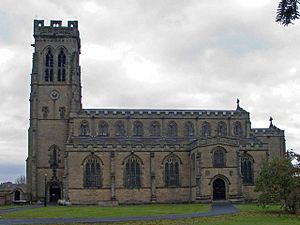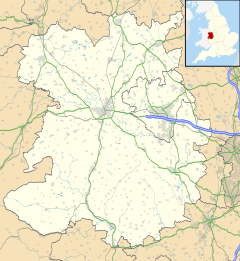Broseley facts for kids
Quick facts for kids Broseley |
|
|---|---|
 All Saints' Parish Church |
|
| Population | 4,929 (2011) |
| OS grid reference | SJ676015 |
| Civil parish |
|
| Unitary authority |
|
| Ceremonial county | |
| Region | |
| Country | England |
| Sovereign state | United Kingdom |
| Post town | BROSELEY |
| Postcode district | TF12 |
| Dialling code | 01952 |
| Police | West Mercia |
| Fire | Shropshire |
| Ambulance | West Midlands |
| EU Parliament | West Midlands |
| UK Parliament |
|
Broseley is a historic market town in Shropshire, England. In 2011, about 4,929 people lived there. The River Severn flows nearby, to its north and east.
In 1779, the world's first iron bridge was built across the River Severn. This bridge connected Broseley with Coalbrookdale and Madeley. This important bridge helped start the Industrial Revolution in the Ironbridge Gorge. Today, this area is a famous World Heritage Site.
Contents
History of Broseley
A settlement already existed in Broseley in 1086. It was called Bosle in the Domesday Book, which was a big survey of England.
Broseley is on the south side of the Ironbridge Gorge. This means it shares much of its history with its more famous neighbor, Ironbridge.
In 1600, Broseley was a small town with only 27 houses. It was part of the Shirlett Royal Forest. The area was well-known for mining. Some of the stone for Buildwas Abbey came from Broseley.
There is also proof that wooden wagonways were used in Broseley in 1605. This makes Broseley one of the oldest railway sites in Britain! These wagonways were likely used to move coal and clay. These natural resources helped the town grow a lot during the Industrial Revolution.
Many important inventions and developments happened in or near Broseley. These are now celebrated by the Ironbridge Gorge Museum Trust. Broseley was a key place for making iron, pottery, and clay pipes. The first pipemaker was recorded working here in 1590. The Broseley Pipeworks is now one of the trust's museums. The Jackfield Tile Museum is also nearby.
John Wilkinson built the world's first iron boat while living in Broseley. The plans for the famous Iron Bridge were also drawn up in Broseley. Abraham Darby I, who found a way to make iron using coke, is buried here.
In the late 1800s, Broseley's industries moved away. This left behind many old mineshafts, ruined buildings, and abandoned quarries.
However, in the last 30 years of the 1900s, Broseley started to grow again. This was helped by the growth of Telford across the River Severn. New homes were built, and old ones were fixed up. Even so, Broseley has fewer people now than it did 200 years ago.
Nature and Environment
Broseley is right next to the Ironbridge Gorge World Heritage Site. You can see signs of the Industrial Revolution all over town. These include old railways, mines, ironworks, and historic buildings.
The "jitties" (small lanes and paths) in Broseley Wood are what's left of old cottage settlements. These were built for miners. On the other hand, the town also has many grand "Ironmaster" houses. These large homes were built in the late 1700s and early 1800s.
Local groups help take care of two wildlife areas.
- The Hay Cop: This area was once the town's water supply. It became a nature reserve in 2007.
- Penns Meadow: This is a five-acre old meadow between Broseley and Benthall. It is managed to protect its diverse wildlife.
Culture and Community
Broseley has a lively arts scene.
- BroADS: This is Broseley's amateur dramatics society. They put on several plays each year.
- Broseley Cinema: Every month, the Birchmeadow Centre shows popular films on a large screen.
- Broseley Artists: This is a group of local artists and crafters.
Since 2009, the Birchmeadow Centre has also hosted live music events. They feature many UK and international artists, mainly playing folk, blues, and ballad music. Famous musicians like Bill Caddick and Steve Knightley have performed here. Live music is also growing in the town's pubs and clubs.
Since 2015, residents have held an annual music festival. It usually takes place in High Street during the second weekend of June. It features local bands and is supported by fundraising events.
Broseley has several historic pubs and places to eat, mostly in the town center. It also has a "Broadplace" facility. This is a small center where people can use computers, get help, and access the internet for free. Broseley Library is also nearby and offers computer access.
Lasting Impact
The bricks and tiles made in Broseley were so famous that their names became linked to any similar product. Broseley bricks are known for their brown and red mixed look. Broseley tiles are a strawberry red to light brown color.
The pipeworks in Broseley made millions of clay pipes. These pipes were sent all over the world. They are very helpful for archaeologists because they don't decay. The maker's stamp on them helps experts figure out when old sites were used.
The new ways of working that started here and in the Ironbridge Gorge helped set the stage for making iron products on a huge scale. This was a big part of the later Industrial Revolution. This was partly thanks to John Wilkinson and his work on making very accurate steam engines and weapons.
Education
Broseley has two primary schools:
- Broseley Church of England (Dark Lane School)
- John Wilkinson School (named after a famous ironmaster)
For secondary school, most students travel to William Brookes School in Much Wenlock. Others go to Abraham Darby Academy in Madeley or other schools.
Local Media
You can get local news and TV shows from BBC West Midlands and ITV Central. TV signals come from the nearby Wrekin TV transmitter.
Local radio stations include:
- BBC Radio Shropshire
- Hits Radio Black Country & Shropshire
- Capital North West & Wales
- Greatest Hits Radio Midlands
The Shropshire Star is the town's local weekly newspaper.
Famous People from Broseley
Many interesting people have connections to Broseley:
- Abraham Darby I (1678–1717): An industrialist who found a new way to make iron. He is buried here.
- John Wilkinson (1728–1808): Lived here and invented a way to make cannons more accurate.
- Jabez Carter Hornblower (1744–1814): A pioneer in steam power, born here.
- William Reynolds (1758–1803): An ironmaster and scientist who died in Broseley.
- Sir Thomas Salter Pyne (1860–1921): An engineer who worked in Afghanistan, born here.
- William Whitehead Watts (1860–1947): A famous geologist, born here.
- Hermione Baddeley (1906–1986): A well-known film and stage actress, born here.
- Shane Embury (born 1967): Bass player for the band Napalm Death, born here.
Sports Stars
- Leroy Watson (born 1966): An archer who won an Olympic bronze medal in 1988. He was born here.
- Sam Aiston (born 1976): A former professional footballer. In 2022, he was the head teacher at Broseley Church of England School.
- Ben Simons (born 1986): An Olympic bobsleigher, born here.
Namesake Town
Broseley also has a namesake town in the United States! The town of Broseley, Missouri was founded in 1915. It was named by William N. Barron to honor his English wife's hometown.
Images for kids
-
Broseley & Ironbridge (in Cyan) shown near Telford
See also
 In Spanish: Broseley para niños
In Spanish: Broseley para niños
 | Stephanie Wilson |
 | Charles Bolden |
 | Ronald McNair |
 | Frederick D. Gregory |





